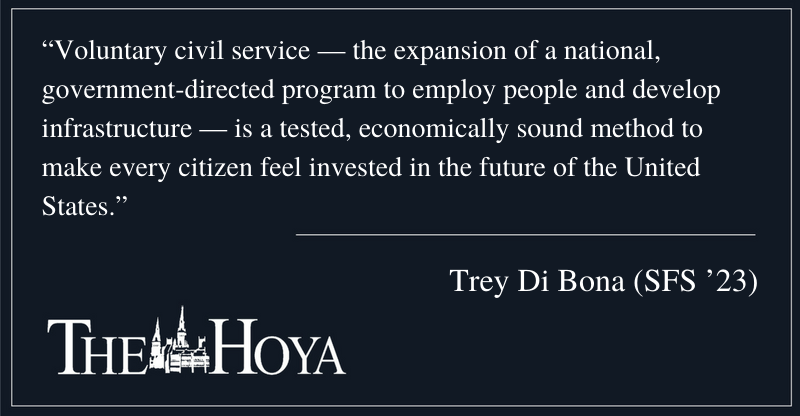As the United States faces increasing political polarization, we must look to specific policy ideas that will help to foster a sense of national unity. Voluntary civil service — the expansion of a national, government-directed program to employ people and develop infrastructure — is a tested, economically sound method to make every citizen feel invested in the future of the United States. The federal government should radically expand the scope of our existing national service programs over the next few years to combat polarization and prepare the U.S. economy for the future.
National civil service programs were first implemented in the United States in 1933 to mitigate the unemployment and economic stagnation caused by the Great Depression. The Civilian Conservation Corps was a voluntary program that put millions of young people to work by building and repairing roads, bridges and lookout towers, maintaining national parks and developing national resources such as fisheries, stands of forest and rangeland. By providing housing, food and wages to three million young people, the CCC both alleviated a vast social problem and created infrastructure that continues to generate economic and recreational value today. Furthermore, the CCC helped revitalize the economy and exploit valuable resources just before the United States entered a critical period in its history.
A concerted national effort to revamp our infrastructure is much needed again today. The American Society of Civil Engineers rated U.S. infrastructure just a D+ on its 2017 Infrastructure Report Card and suggested that approximately $4.5 trillion worth of repairs and investment are needed to bring it back up to speed. According to that report, the United States has 15,500 high-hazard dams, as well as more than 200,000 bridges that are more than 50 years old. Thirty-two percent of urban roads and 14% of rural roads, meanwhile, are in poor condition. A revamped national service scheme could address some of these shortfalls that affect both quality of life and economic output — the latter of which is positively correlated with improved infrastructure.
Civil service programs would also benefit the United States’ relationship with the rest of the world. While the United States has historically stood behind free trade schemes, recent reversals in policy, such as renegotiating or pulling out of free trade deals, reflect anxiety about our place in a globalized economy. The creation of new high-speed passenger and freight railroads would boost the efficiency of trade and the interconnectedness of our cities while increasing the viability of public transport and cutting emissions.
National service work in education and professional development would help to create a new generation of skilled workers and mitigate the pain caused by deindustrialization — and its associated structural unemployment — by retraining workers for jobs in sectors in which the United States retains a competitive edge. The strengthening and specialization of our economy in this way would cement our ability to thrive in an internationalized, liberal economic system.
National civil service could also help to resolve the social problems with which we are constantly grappling. Infrastructure investment in low-income communities would brighten residents’ economic prospects, and national service programs have already been shown to improve the quality of teaching in elementary through high schools in underprivileged areas. Furthermore, working together with people from many backgrounds on projects like infrastructure and education would help foster a sense of camaraderie and shared investment in the future of the country among young people.
An expanded national civil service program would not be politically difficult to implement. The CCC was by far the most popular New Deal program, with some 80% of the public in favor of it. The idea of a large-scale national service program remains popular today, with nearly four in five Americans supporting it, including 78% of Republicans and 90% of Democrats. In addition, 78% of all Americans think national service teaches values such as civic duty and patriotism, and 79% think it builds stronger communities. Clearly, an overwhelming majority of the public sees the value of these programs, underscoring the economic and social profit of implementing them.
National and state civil service programs such as Teach For America and AmeriCorps continue to put young people to work today, and the number of applicants to these organizations far exceeds their capacity. The U.S. government should expand these kinds of programs, fund them adequately and promote them to young people. With such changes, we could solve our infrastructure problem, maintain our economic competitiveness and rekindle a sense of much needed national spirit.
Trey Di Bona is a freshman in the School of Foreign Service.














